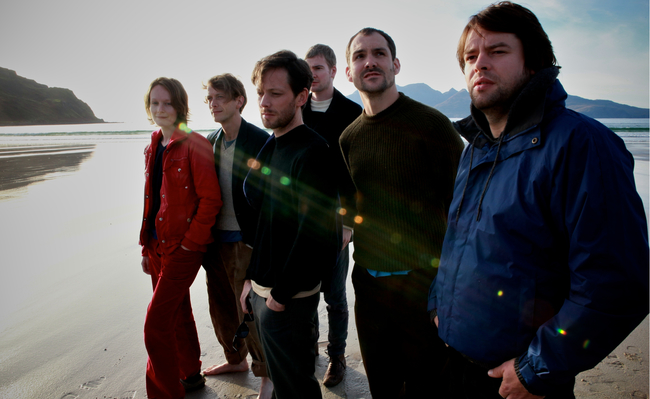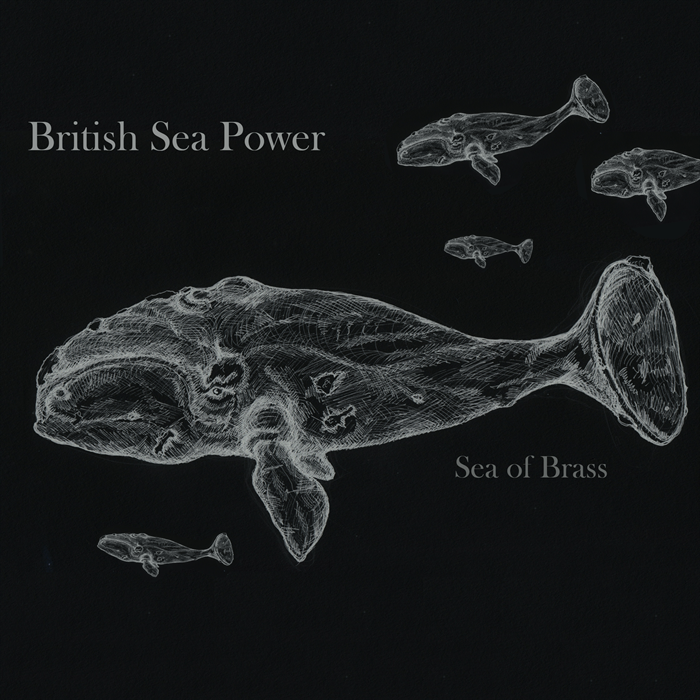Formed in 2000, in East Sussex, England, the prolific and proficient British Sea Power has released nine full-length albums in their fifteen years of activity, from 2003’s The Decline of British Sea Power to 2015’s Sea of Brass. This discography consists of standard albums and full-length documentary-film soundtracks, which have also become a proclivity for the group. British Sea Power has amassed a strong following as early as its first years, owing to the members’ predilection for staging elaborate productions for their live performances and for adopting interesting musical and lyrical themes (obsession for water, nature, birdwatching, and cartography) that are typically unusual for Alternative Rock bands such as theirs. The quirky group currently consists of Jan Scott Wilkinson (vocals, guitar), Martin Noble (guitar), Neil Hamilton Wilkinson (bass, guitar, vocals), Matthew Wood (drums), Phil Sumner (keyboard, cornet), and Aby Fry (viola). Its distinct sound may be best characterized by the layers of shoegazey and shimmery guitars, synthesizer drones, driving basslines, big drums, and an interplay of frenetic and whispery vocal delivery, all of which are set on a heavily textured and orchestrated backdrop of strings and horns.
Some sonic references may be made to Post-Punk New Wave pioneers such as The Armoury Show (“Castles in Spain”), Big Country (“Fields of Fire [400 Miles]”), Cactus World News (“The Bridge”), and White China (“Smiles & Jokes”), whose primary common denominator is the sense of urgency in the energetic guitar playing and vocal delivery. From the recent batches of purveyors of the genre, kindred sonic spirits include Arcade Fire (“Rebellion [Lies]”), The Killers (“When You Were Young”), Maritime (“Tearing Up the Oxygen”), and even a haze of the impassioned angst of 30 Seconds to Mars (“From Yesterday”). Songs of British Sea Power that best align with the intensity of these cited classics and would-be classics include “Remember Me,” “Carrion,” “Please Stand Up,” “True Adventures,” “Lights Out for Darker Skies,” “Waving Flags,” “We Are Sound,” “Observe the Skies,” “A Light above Descending,” and “When a Warm Wind Blows through the Grass.”
Having developed a penchant for writing soundtracks to various documentary films, British Sea Power has also released three original-soundtrack albums: 2009’s Man of Aran, 2013’s From the Sea to the Land Beyond, and 2014’s Happiness. Interestingly, the band’s latest album was most likely inspired by these cinematic, film-score excursions. Released on October 30, 2015, Sea of Brass is British Sea Power’s overall ninth album. It actually consists of reworkings of some of the band’s past songs accompanied by a 28-piece brass ensemble, making the whole affair classically orchestral in approach. It opens with the sparsely orchestrated, slowly ascending instrumental ballad “Heavenly Waters,” which is originally a bonus track of the adventurous band’s debut album. Its subtle brass arrangement and sparkly piano trills evoke an imagery of ocean waves. Following next, with a very smooth transition, is the equally graceful and somber flow of “Once More Now,” from 2011’s Valhalla Dancehall. The introspective “Albert’s Eyes,” a B-side off the debut album, features trembling, fragile vocal delivery and prominent guitar plucks floating atop an undercurrent of now more-melodic brass lines. “Atom” is a change of vibes, from dramatic to climactic; it starts as an ominous-sounding, Gothic-inspired mid-tempo and then suddenly transforms into a proper Guitar Pop song with a glaze of orchestral majesty, topped with soaring and celebratory vocal shoutouts. The mood returns to a relaxing atmosphere as “A Light above Descending” plays on; its bright and flickery guitar plucks and swelling orchestration can take the listener to a sub-oceanic sonic sojourn.
A fuller-sounding rendition of the title track of the band’s sixth album, the upbeat “Machineries of Joy” is a further journey into the deeper parts of the ocean; its catchy New Wave melodies may conjure in the mind of any sea-diving aficionado, a lovely encounter with dolphins, manatees, whale sharks, and other gentle creatures of the sea. “When a Warm Wind Blows through the Grass” is a change of mood and pace. Its sonic doominess and solitariness exudes a sense of mystery and a feeling of anticipating something unexpected. In Classical parlance, it shares the foreboding and melancholic elements in the works of the German composer Richard Wagner (“Ride of the Valkyries”). Finally, the standard edition of Sea of Brass is aptly rounded up by the grandiose choral instrumental “The Great Skua,” a track that was culled off 2008’s Do You Like Rock Music?
Assessing the entire discography of British Sea Power, paying keen attention to the development of the band’s aural architecture and thematic musings, the initiated will attest that the music of this peculiarly creative and imaginative band is no longer just plain Alternative Rock. British Sea Power was able to elevate its music onto the monumental realms of Neo-Classical, combining select aspects of various genres that include New Wave, Post-Punk, Pop, and Classical. Sea of Brass is another brilliant addition to British Sea Power’s growing body of well-conceptualized and well-crafted works. CrypticRock gives it 4 out of 5 stars.








No comment